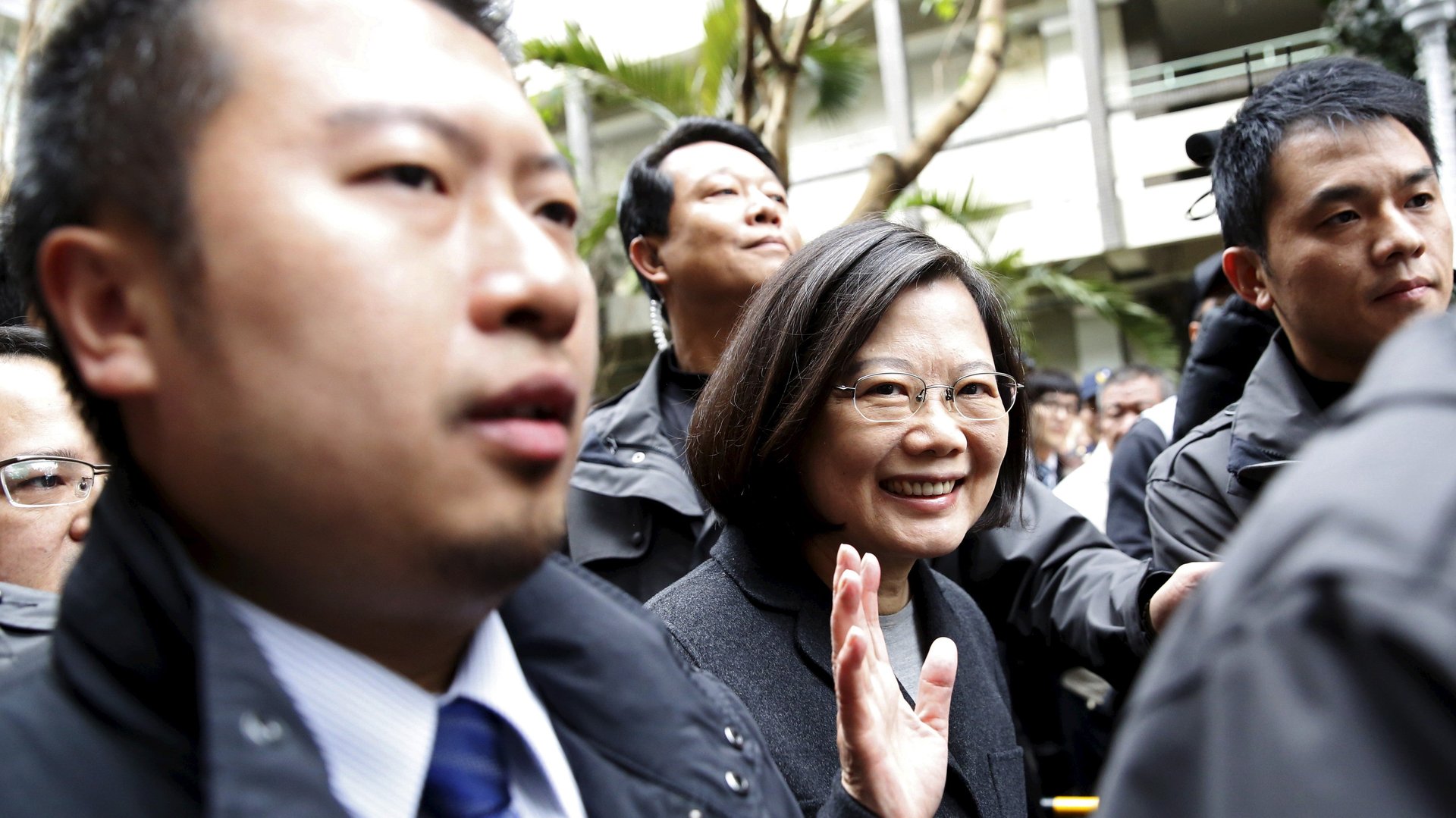Taiwan’s new president is a female academic who loves cats and supports gay rights
Taiwanese citizens appear to have elected Democratic Progressive Party (DPP) candidate Tsai Ing-wen to be the island’s next president by a decisive margin. Although all the votes have not been counted yet, votes for Tsai are currently at 56% of more than 8 million votes cast, according to domestic media outlet UDN, and her opponent Eric Chu of the pro-Beijing Nationalist Kuomintang (KMT) party has just conceded defeat (link in Chinese).


Taiwanese citizens appear to have elected Democratic Progressive Party (DPP) candidate Tsai Ing-wen to be the island’s next president by a decisive margin. Although all the votes have not been counted yet, votes for Tsai are currently at 56% of more than 8 million votes cast, according to domestic media outlet UDN, and her opponent Eric Chu of the pro-Beijing Nationalist Kuomintang (KMT) party has just conceded defeat (link in Chinese).
Chu currently has 31% of the votes, ahead of the People First Party candidate who won over 10%. Taiwan’s Central Election Commission also shows the DPP taking a huge lead in the island’s legislative elections, with 46% of all votes cast going to the party, compared to 25% for the KMT. Crowds of DPP supporters are celebrating in Taiwan:
Tsai, 59, earned a law degree from Cornell and a PhD from the London School of Economics, and taught law in Taiwan before entering politics in the 1990s, and making a failed presidential run in 2012. She will become Taiwan’s first female president, and arguably the most powerful woman in the Chinese-speaking world.
Tsai is the second DPP politician to assume presidency of the 23 million population island, which China views as a province but has ruled itself independently for decades. The first, Chen Shui-bian, who served from 2000 to 2008, has a tarnished legacy following a corruption scandal, and Tsai is widely credited with turning the party around afterward. Otherwise the KMT has ruled the island since 1949, when Chiang Kai-Shek retreated from the mainland during the Chinese civil war with Mao Zedong.
Her ascendancy comes amid widespread discontent with the KMT, which ran the island for past eight years under president Ma Ying-Jeou. During his tenure, the island’s economy flat-lined despite deeper economic integration with the mainland. Resentment towards the KMT peaked in March 2014, after the legislative yuan passed a trade pact with China. The student-driven Sunflower Movement blossomed in response, and grassroots protests swept the island.
Before last year’s gay pride parade in Taipei, Taiwan’s capital, Tsai declared her support for gay marriage, saying in a video on Facebook:
In the face of love, everyone is equal. Let everyone have the freedom to love and to pursue their happiness. I am Tsai Ing-wen, and I support marriage equality.
Her love of her two cats “Xiang xiang,” or “Think think,” and “Ah Tsai,” is well-known. One of them starred in her Chinese New Year’s message last year.
Tsai and the DPP have been the main beneficiaries of the youth-powered Sunflower Movement, which was only slightly less hostile towards that party than the KMT. Party identification among Taiwan residents has zig-zagged back and forth from the KMT to the DPP over the past decade and a half.
Tsai’s victory will put Beijing in a difficult position. She herself has not publicly advocated for independence, and will likely try to preserve the “status quo” relationship Beijing and fight for greater economic cooperation. But she has also never expressed support for unification, or for the so-called 1992 consensus, which entails that both Taiwan and mainland China each acknowledge that there is only “One China”—however that might be defined. Beijing views Taiwan as part of China, and if it views Tsai’s administration as opposed to these ideals, it might further isolate the island economically and politically.